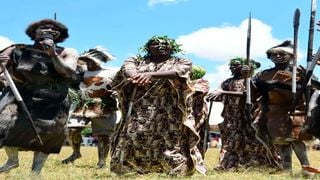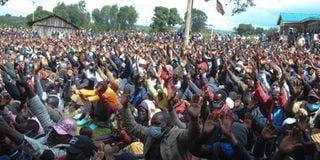Breaking: Autopsy reveals how Cyrus Jirongo died

Members of the Ogiek community perform a jig during Mashujaa Day celebrations at 64 Stadium in Eldoret town, Uasin Gishu County on October 20, 2019.
Counties
Premium
Elusive justice as Ogiek wait for state to act on court ruling on forest rights
Less than nine months to the next General Election, the Ogiek community is still waiting for implementation of a landmark judgment made four years ago.
May 26, 2017, was a historic day for the Ogiek. After nearly five years of a legal battle, the African Court on Human and People's Rights based in Arusha Tanzania, ruled that the Kenyan Government had violated the rights of the Ogiek people by repeatedly evicting them from their ancestral lands in the Mau Forest.
The judgment, which found that the government had broken seven out of 68 articles of the African Charter on Human and Peoples’ Rights, ordered it to take remedial action.
But almost five years later, the Ogiek are still waiting for the implementation of the judgment.
The community is now caught between unresolved historical injustices, which include a bid to regain their ancestral land and a push to protect a fast fading culture.
According to Mr Daniel Kobei, the executive director of the Ogiek Peoples' Development Programme (OPDP), a Kenyan-based NGO that has been fighting for the rights of the community, justice has been delayed and remains elusive.
"We urge the government to move swiftly and ensure the landmark judgment is implemented fully. We need back our land, which extends over 21 government forest blocks and the Maasai Trust Land Forest that make up the Mau Complex. Once resettled, we shall protect and take care of the Mau Forest water tower through community forest protection associations,” said Mr Kobei.
He wants the government to move swiftly and give the Ogiek land and a title deed to end frequent land conflicts in areas occupied by the community.
Mau conflicts
According to him, the incessant land disputes involving the community have been the source of frequent conflicts between communities bordering the Mau Forest Complex. The Ogiek interviewed by the Nation say they want the government to resettle them in their ancestral land in the Mau Forest and issue them with a general title deed for the entire community so that they can develop themselves.
The community has lagged behind economically due to historical injustices such as loss of its ancestral land, among other tribulations.
"We want back our ancestral land. We deserve to be treated like the rest of Kenyans and be given our land. We have suffered for long because we do not have title deeds for our land. A caveat was placed on the land here. We, therefore, cannot secure loans or build permanent structures on this land,” said Mrs Jennifer Cheruiyot, from Marioshoni, Nakuru County.
"We are not able to take our children to school because we do not have money,” she added.

Members of the Kipsigis and Ogiek communities following proceedings during a peace meeting at Nessuit grounds in Njoro Sub-County on August 4, 2020.
The community has assured the government it will lead in conserving the Mau Forest if allowed back to its ancestral land.
Meanwhile, the Ogiek community is also fighting to protect their culture, including language and sacred places, and to have the community recognised as a distinct tribe to avoid assimilation.
"We request the government to intervene and safeguard the dignity of our community as one of the more than 40 tribes in Kenya," said Ms Margaret Kipkemoi, from Nessuit in Nakuru County.
They say evictions from the forest negatively impacted their traditional religious and cultural lifestyle. The forest dwellers survived mainly on wild fruits and roots, game hunting and bee-keeping.
More representation
The community further wants proper representation in both the county and national government.
"We demand for more representation and empowerment of the community through education. The only leader we had was Senator Victor Prengei, who died in a road accident some months ago,” said Mr Peter Kiplangat.
The Ogiek community is worried that the implementation of the judgment might have ran into headwinds.
The government, which is fighting encroachment into water catchment areas, appears reluctant to implement the ruling.
Since 2018, the government has stepped up a bid to evict illegal settlers from the Mau Forest Complex, before the bid was stopped by the courts.
The African Court, in its judgement, issued against the Government of Kenya in respect of the rights of the Ogiek, found that the 35,000-member forest-dwelling community was illegally evicted from its ancestral land in the water tower, and that their rights were violated.
The court also found that the community's rights on religion, life, property, culture, development and non-discrimination were violated during the eviction after they resisted.
Ms Lucy Claridge, a London based lawyer litigated the case before the African Court.
The government's bid to resolve perennial land disputes in the Eastern Mau Forest last year and implement the landmark judgment ran into headwinds after the Ogiek opposed the move.
The process suffered a setback on December 17, 2020, after the Environment and Land Court temporarily stopped the planned issuance of title deeds. Through the Ogiek Council of Elders, the community moved to court protesting against a multi-agency team set up by the government to conduct the issuance, saying there was no proper consultation.
They argued that the move was in contravention of the judgment by Arusha court, which recognised the community as the indigenous forest dwellers entitled to the forest.
Justice John Mutungi, in his ruling, directed that the process be halted to allow for consultations between the parties.
The court further consolidated four petitions which were filed separately over the same subject.





